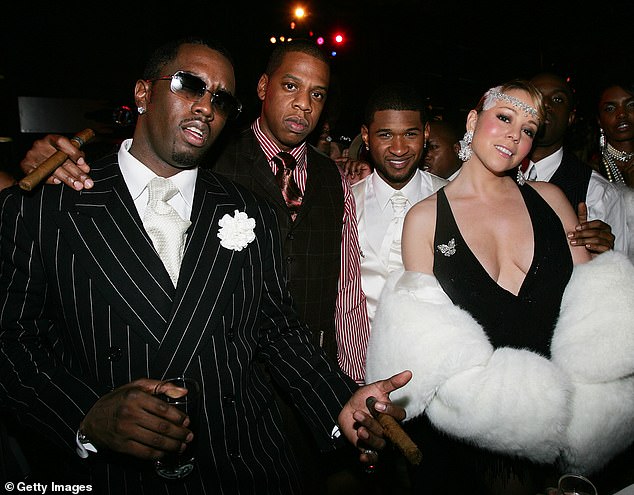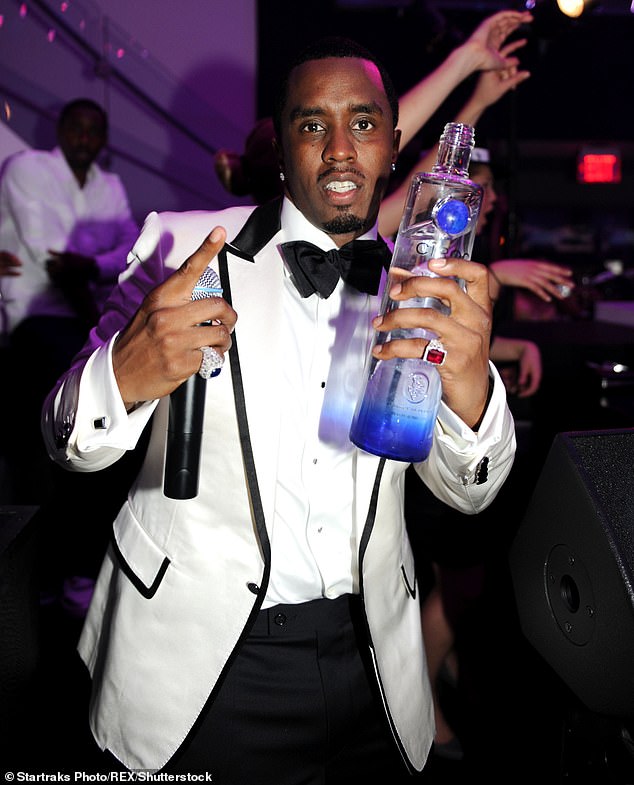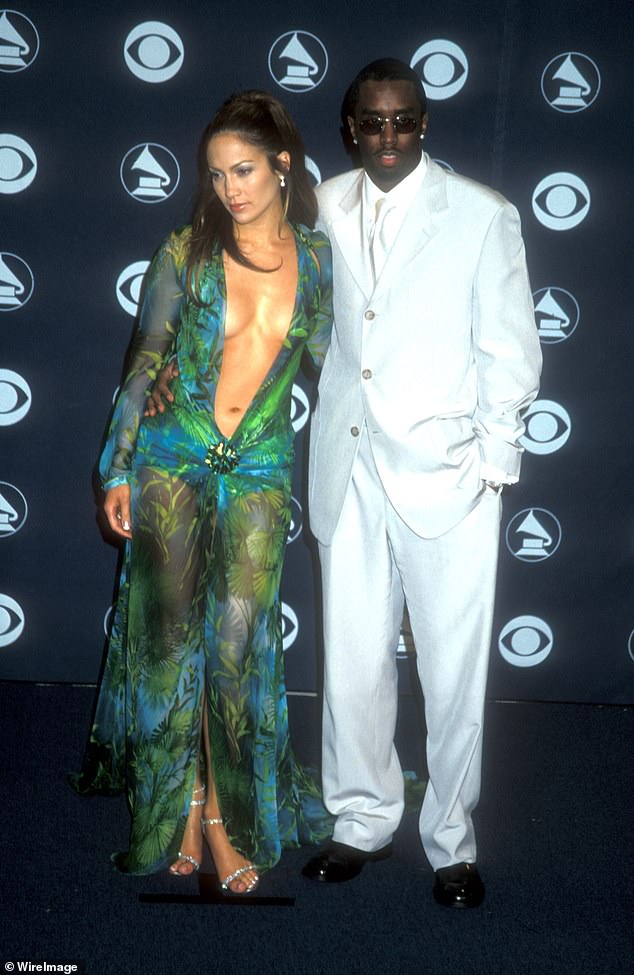My VERY revealing afternoon with Diddy in his luxury caravan in the Californian desert, writes GUY ADAMS as hip-hop mogul faces allegations of rape, abuse and sex trafficking
Love is something I live for,” hip-hop mogul P. Diddy declared when I worked up the courage to ask about his unconventional private life.
‘Love is something I need. But I haven’t been able to be successful at it.’
The mood in the luxury caravan where I was trying to interview the 41-year-old father of six (by three different women) was becoming very chilly indeed.
“Is that why,” I continued, “you never decided to settle down and get married?”
Before I met Diddy (real name Sean Combs), I was told three things. First of all, he’s going to be late. Secondly, there will be a huge entourage. Third, despite being a household name, Diddy hates – absolutely hates! – talking about everything related to his domestic arrangements. All three turned out to be 100 percent true.
P Diddy (real name Sean Combs) is facing a flood of criminal allegations, from rape and sex trafficking to sexual assault and even child abuse
“Look,” Diddy replied, leaning forward from a white leather couch. ‘In a perfect world, of course, things would have happened that way. I would have married one of the women I had children with.
‘But it didn’t work that way. Right now I have no desire to get married, or a desire not to get married. So far I just haven’t been able to do it. For some people it does happen. For others it just doesn’t happen. It’s something I leave in God’s hands. OK?’
With that, the line of conversation was politely but firmly closed: an American PR manager said it was time for me to ask a few questions about one of his recently launched perfume lines.
It was 2011. I was working in Hollywood as a correspondent for a national newspaper. Diddy (“call me Sean”) was in the midst of an extraordinary transformation from streetwise rap artist to billionaire founder of global lifestyle brands.
My audience with this titan of the entertainment industry, which took place on the set of a music video in the Mojave Desert, several hours’ drive north of Los Angeles, was expected to last approximately 45 minutes.
But that little conversation above was the closest we came to breaking down the impenetrable facade P. Diddy maintained during our meeting.
Thirteen years later, I’m starting to understand why. Because Diddy’s tightly protected private life is today the center of a grotesque scandal that threatens to shake the American entertainment industry to its foundations.
Today, the 54-year-old former rap artist is being held at the Metropolitan Detention Center in Brooklyn, New York, where he faces a flood of criminal charges, from rape and sex trafficking to sexual assault and even child molestation.

Diddy with rapper Jay-Z and singers Usher and Mariah Carey at an event in New York in 2004

Dozens of women have claimed they were drugged and raped by Diddy after meeting him at exclusive bars and nightclubs he frequented during his music career.
Police have raided his homes in Florida and LA, seeking evidence to support claims aired in a series of lawsuits accusing the musician of using his wealth and celebrity to cover up depraved sexual behavior over decades.
Combs’ attorney says the rapper “emphatically and categorically denies any claim that he sexually assaulted anyone, including minors, as false and defamatory.”
Last week, an attorney named Tony Buzbee, who is acting for 120 alleged victims, held an extraordinary press conference in which he vowed to file lawsuits in multiple states naming “a lot of powerful people” with “a lot of dirty secrets” related to their friendship . with Diddy.
Dozens of women have claimed they were drugged and raped by Combs after meeting him at exclusive bars and nightclubs he frequented during his music career. One male employee, music producer Rodney Jones, has portrayed him as an Epstein-like figure and said he was forced by Diddy to have sex with prostitutes while the star videotaped the encounters.
Their testimony suggests that Diddy’s carefully cultivated public image was hiding some very dark secrets.
There was certainly something highly unusual about the man I met all those years ago. Despite being a wealthy multi-millionaire, with the kind of lifestyle that others dream of, he was strangely melancholic. As I noted at the time, he never smiled once during the time I spent in his company. But the strange behavior seemed very much part of a brand.
Our first scheduled meeting was to take place in one of the famous ‘bungalows’ of the Beverly Hills Hotel, where old Hollywood stars such as Charlie Chaplin and Marilyn Monroe held court. But it was canceled about three hours after our 10am appointment because Diddy overslept after a late night party.
When we finally caught up on the aforementioned music set, I got to hang around and watch Diddy being followed by an entourage that included two personal assistants, a personal chef, a butler, a valet on full duty to fix his toothpicks and a stylist named Dave, who kindly loaned me one of the artist’s cashmere cardigans to protect against the cold.
A price tag still attached revealed it cost $2,500. Diddy’s caravan was outfitted with white leather sofas and fur rugs, and lit by dozens of expensive-smelling Diptyque candles costing more than £50 each.
The man himself wore diamonds, furs, dark glasses and a set of completely gold teeth. It was part of an image that allowed him to sell clothes (under the Sean John label), fragrances (“Unforgivable” and “I Am King”) and a popular vodka brand (Ciroc).

Singer Jennifer Lopez pictured with P Diddy at the 2000 Grammy Awards in Los Angeles. The pair dated from 1999 to 2001
‘What I sell, honestly, I sell lifestyle. I sell entertainment. It all falls under one umbrella, one mentality,” is how he explained the company to me.
His life story was extraordinary on paper: Diddy, the son of a Harlem street dealer who was shot to death as a toddler, first rose to prominence through New York’s drug- and crime-fueled gangster rap scene in the early 1990s. When I asked how he first achieved success, he attributed it to an uncanny ability to identify hit songs.
“From the time I was 12, I could hear records on the radio, and the first time I heard them I said, ‘I like that record.’ Every time it would be a top ten hit,” he recalls. ‘The first time I heard a record, I knew it would be a hit if I really liked it. So I felt like I had an ear.”
In 1997, Diddy first entered the mainstream news pages through the murder of his best friend and creative partner Christopher Wallace – known by the stage name ‘Biggie Smalls’ – during a dispute between rival rap gangs.
In the wake of the tragedy, he released a tribute to his late friend: I’ll Be Missing You, sampling the Police song Every Breath You Take. It reached number 1 in 15 countries. That success convinced Diddy that a significant fortune could be made producing a hip-hop brand that could be sold to the American middle class.
By the time we met, the former gang member had become a fully paid-up member of the celebrity class, starring in films like Get Me To The Greek (in which he rubbed shoulders with another fallen star, Russell Brand) . ), and reality TV shows, including I Want To Work For Diddy, an Apprentice impersonation in which he tests potential employees by having them complete important tasks, such as buying him a piece of cheesecake in Manhattan, to 2am.
In 2010, Forbes estimated his annual earnings at $30 million (£19 million) and estimated his net worth at ten times that amount. In 2022, he was declared a billionaire.
When we met, he was happiest when bragging about his commercial success (“Look, I’m one of the greatest to ever do it,” was how he described his career), and irritable when it came to almost everything else .
During this period, he had placed his several children and ex-girlfriends in a collection of luxury homes in Florida, where he occasionally flew to take them on superyacht vacations. Still, the somewhat unorthodox arrangement is said to have hidden some ugly secrets.
They first became public in November last year, when ex-girlfriend Casandra Ventura filed a lawsuit accusing him of rape, assault and sex trafficking. She said he was ‘prone to uncontrollable anger’, with claims that he ‘blew up a man’s car after learning he was romantically interested in Ms Ventura’.
She accused him of plying her with drugs, beating her and forcing her to have sex with a series of male prostitutes while filming the encounters. Toward the end of their 13-year relationship in 2018, the lawsuit said Diddy broke into her home and raped her.
A day after the legal complaint was filed, Diddy – who denied wrongdoing – settled the case anyway.
Yet within days, the ensuing publicity had led to two more women filing similar lawsuits, alleging that he had also abused them several years earlier. By March, five accusers had been made public and the Department of Homeland Security had opened an investigation.
Then, in May, CNN obtained surveillance video from an LA hotel that showed Diddy, wearing only a towel and socks, kicking, punching and dragging a woman identified as Ventura, sometime in 2016.
“He is a flawed person, but not a criminal,” his lawyers said. But the detectives disagreed: on September 16, when the number of complainants numbered in the dozens, he was finally arrested.
Diddy’s future is now in the hands of the American legal system. A sad fate for a man who, when we met, seemed preoccupied with his legacy as a role model for aspiring black Americans. “To whom much is given, much is expected,” he said when I asked how he wanted to be remembered.
‘I have to take that responsibility. To be a shining example of a real person, who strives to be the best I can be, the best person and father.”
That ship has now sailed well.
